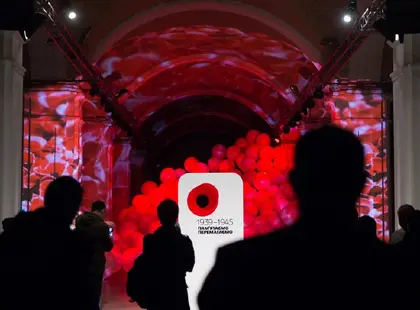With this decision, Ukraine joins a range of Western countries that use a poppy flower as a remembrance symbol for the war victims. And yet, historians argue that this symbol is not imported. It is found in Ukrainian folk culture, they say.
“The red poppy is a traditional Ukrainian symbol of the shed blood of Cossacks,” Volodymyr Vyatrovych, head of the Ukrainian Institute of National Memory, said at an event to promote the remembrance poppy in Kyiv on April 7. “It is (also) a European symbol that commemorates victims of the World Wars.”
JOIN US ON TELEGRAM
Follow our coverage of the war on the @Kyivpost_official.
The Ukrainian folk song “Po Horakh Snihy Lezhat” (“Snow Lies in the Mountains”) tells about the Cossacks killed on their way to fight Tatars in Crimea. In the song, the red blooming alongside the road are a metaphor for the blood of the Cossacks.
“Those are not red poppies, those are young Cossacks,” the song goes.
Ukrainian Cossacks, the democratic military community, emerged in the 14th-15th centuries and active in the next two centuries, so that is when the folk song with a poppy reference was probably written.

In Ukraine, the Remembrance Poppy symbol was first used publicly in May 2014. Kharkiv-based designer Serhiy Mishakin came up with a Ukrainian version of a red poppy symbol for the Victory Day. It replaced the orange-and-black St. George’s Ribbon, the Victory Day symbol imposed by Russia and previously used in Ukraine too. In 2014, the ribbon began to associate with Russia-backed separatists in Crimea and Ukraine’s east and their supporters.
In an interview to Ukrainska Pravda, Mishakin explained that the red poppy looks like a wound. The image shows an allusion, resembling a trail of blood.
Official Ukrainian version of the Remembrance Poppy was designed with the assistance of Ukrainian National Memory Institute and the National Television Company of Ukraine. The poppy is accompanied by a motto that reads, “Never Again.”
“We tried to find a solution that was graphically simple,” Mishakin was quoted as saying. “When you pin it (to your clothes), it’s like you try on a bullet wound.”
In the English-speaking countries, the poppy badge honors all soldiers who fought and died in all wars.
Canadian surgeon John McCrae wrote a poem during World War I called In Flanders Fields.
“Once the war was over, the poppy was one of the only plants to grow on the otherwise barren battlefields,” the BBC explains.
You can also highlight the text and press Ctrl + Enter




